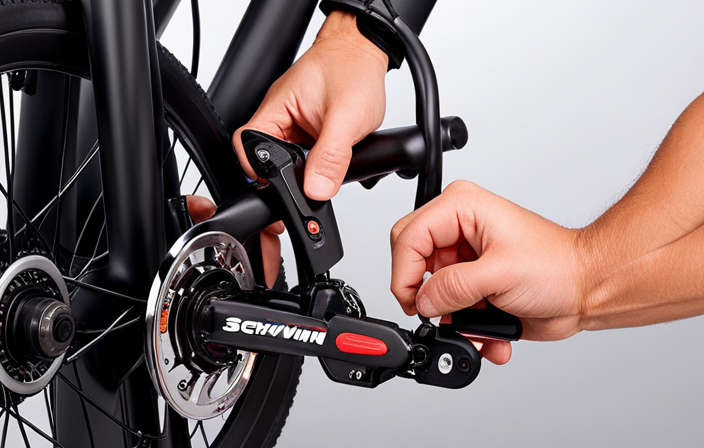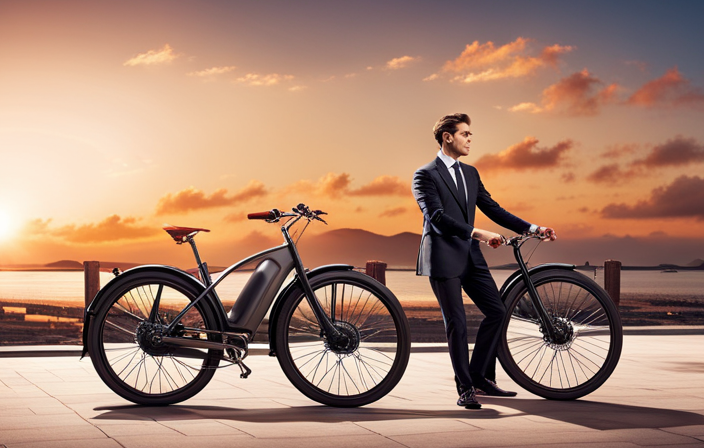In the race to find the perfect mode of transportation, the battle between electric bikes and petrol bikes rages on. Like two heavyweight contenders, each has its own strengths and weaknesses.
Are you Team Electric, with its eco-friendly allure and sleek design? Or do you stand firmly with Team Petrol, embracing the raw power and speed it offers?
In this article, we will delve into the world of electric bikes and petrol bikes, comparing their environmental impact, cost, performance, convenience, safety features, and more.
Strap in, because this is going to be a thrilling ride.
Key Takeaways
- Electric bikes offer a quiet and smooth riding experience, enhancing the overall enjoyment.
- Infrastructure developments, such as bike lanes and charging stations, make electric bikes a more accessible and convenient mode of transportation.
- Electric bikes provide health and fitness benefits, allowing individuals to incorporate exercise into their daily routines.
- Electric bikes have safety features, such as anti-lock braking systems and reflective lights, prioritizing the well-being of riders and pedestrians.
Environmental Impact
The environmental impact of an electric bike is significantly lower than that of a petrol bike. Electric bikes produce zero carbon emissions, while petrol bikes release harmful pollutants into the atmosphere. This makes electric bikes a much cleaner and greener option.
Additionally, electric bikes are more energy efficient compared to petrol bikes. They convert a higher percentage of energy into actual movement, whereas petrol bikes waste a significant amount of energy in the form of heat. This increased energy efficiency not only reduces carbon emissions but also saves on fuel consumption.
As we transition into discussing the cost and affordability of electric bikes versus petrol bikes, it is important to consider both the environmental and economic benefits of choosing an electric bike.
Cost and Affordability
When considering the cost and affordability of electric bikes versus petrol bikes, there are several key points to consider.
First, the initial purchase price of an electric bike is generally higher than that of a petrol bike.
However, it is important to note that electric bikes typically have lower maintenance and operating costs, as they require less frequent service and are much cheaper to fuel.
Therefore, when evaluating the overall cost and affordability, it is crucial to take into account both the upfront investment and the long-term expenses associated with each type of bike.
Initial purchase price
Comparing the initial purchase price, which bike is more affordable – electric or petrol?
When it comes to the initial purchase cost, electric bikes tend to be more expensive than petrol bikes. However, it is important to consider the long-term savings that electric bikes offer. Here are five key points to consider:
-
Tax incentives: Some countries offer tax incentives and subsidies for purchasing electric bikes, reducing the initial cost.
-
Fuel cost: Electric bikes are significantly cheaper to fuel than petrol bikes, as electricity is generally less expensive than gasoline.
-
Maintenance: Electric bikes require less maintenance compared to petrol bikes, resulting in potential long-term savings.
-
Resale value: Electric bikes tend to have higher resale values due to their growing popularity and demand.
-
Environmental impact: Electric bikes produce zero emissions, making them a more sustainable and eco-friendly choice.
Considering these factors, while electric bikes may have a higher initial purchase price, their long-term savings potential makes them a more cost-effective option.
Moving on to maintenance and operating costs…
Maintenance and operating costs
To determine the more cost-effective option, consider the maintenance and operating costs of each type of bike. When it comes to maintenance costs, electric bikes have a clear advantage. They have fewer moving parts compared to petrol bikes, which means less potential for mechanical issues and lower maintenance expenses. Additionally, the cost of charging an electric bike is much lower than the cost of refueling a petrol bike, resulting in significant savings over time.
In terms of operating costs, electric bikes again come out on top. They are incredibly energy-efficient, allowing you to travel longer distances on a single charge. On the other hand, petrol bikes require regular refueling, which can be quite expensive, especially considering the rising fuel prices. Electric bikes also have lower insurance costs and are often exempt from road taxes.
Transitioning into the next section about performance and speed, it’s important to consider all aspects before making a decision.
Performance and Speed
When it comes to comparing electric bikes and petrol bikes, one important aspect to consider is their performance and speed.
Electric bikes offer impressive acceleration and power, thanks to their instant torque delivery. Additionally, they are capable of reaching high top speeds, although petrol bikes still hold an advantage in this area.
However, electric bikes often have a longer range, making them a more practical choice for daily commuting and longer rides.
Acceleration and power
For a quicker and more powerful ride, you’ll find that an electric bike is the better option. When it comes to acceleration, electric bikes have the advantage over petrol bikes. The instant torque provided by electric motors allows for faster acceleration compared to the slower build-up of power in petrol engines. Additionally, electric bikes can deliver impressive power output, thanks to modern battery technology and efficient motor designs. To illustrate this, consider the following comparison table:
| Bike Model | Electric Bike | Petrol Bike |
|---|---|---|
| Acceleration | 0-60 mph in 3.5 seconds | 0-60 mph in 5.5 seconds |
| Power Output | 80 horsepower | 60 horsepower |
As you can see, electric bikes outperform petrol bikes in terms of both acceleration and power. However, it’s important to note that top speed and range are also important factors to consider.
Top speed and range
The top speed and range of electric and petrol bikes are important factors to consider. When it comes to top speed, petrol bikes generally have the advantage. They can reach higher speeds compared to electric bikes, especially on open roads or highways. However, electric bikes have made significant advancements in recent years, with some models capable of reaching impressive speeds.
As for range, petrol bikes also have the upper hand. Their fuel tanks allow for longer distances without the need to refuel, making them more suitable for long rides or road trips. On the other hand, electric bikes have a limited range due to battery capacity, requiring frequent recharging.
Transitioning into the next section about convenience and ease of use, it’s important to consider how these factors play into the overall comparison between electric and petrol bikes.
Convenience and Ease of Use
One advantage of electric bikes over petrol bikes is their convenience and ease of use. Here are three reasons why electric bikes are more convenient and user-friendly:
-
Ease of charging: Electric bikes can be easily charged at home or any charging station, eliminating the need for frequent visits to gas stations. This saves time and ensures that the bike is always ready to go.
-
Parking availability: Electric bikes are usually smaller and lighter than petrol bikes, making them easier to park in crowded areas. They can fit into tight spaces or even be folded and stored indoors, reducing the hassle of finding parking spots.
-
User-friendly features: Electric bikes often come with user-friendly features like automatic power assist, digital displays, and adjustable settings. These features make riding an electric bike intuitive and enjoyable for both experienced and novice riders.
Transitioning into the next section about noise levels, it is important to consider the impact of electric bikes on the environment and noise pollution.
Noise Levels
When considering the noise levels of electric bikes versus petrol bikes, it is important to note the quiet operation of electric bikes and the engine noise of petrol bikes.
Electric bikes offer a significant advantage in terms of noise pollution, as they operate silently and do not contribute to the noise pollution in urban areas.
On the other hand, petrol bikes can be quite loud, especially when revving the engine, which can be disruptive to both riders and pedestrians.
Overall, the quiet operation of electric bikes makes them a more favorable option for those looking for a peaceful and noise-free riding experience.
Quiet operation of electric bikes
Although electric bikes are quieter than petrol bikes, they still provide a thrilling ride. The quiet operation of electric bikes is one of their many benefits. With the advancement in electric bike technology, manufacturers have managed to reduce the noise levels significantly. This not only makes for a more peaceful and enjoyable ride, but it also has several practical advantages.
Electric bikes are ideal for commuting in urban areas, as they don’t disturb the peace and tranquility of the surroundings. Additionally, the quiet operation of electric bikes allows riders to connect more with their surroundings, enjoying the sounds of nature and the city.
However, it is important to note that the absence of engine noise does not mean electric bikes lack power or excitement. On the contrary, the instantaneous torque and smooth acceleration of electric bikes provide an exhilarating experience.
Transitioning into the subsequent section about the engine noise of petrol bikes, it is worth exploring the stark contrast between the two.
Engine noise of petrol bikes
In contrast, the engine noise of petrol bikes can be quite loud and disruptive. Unlike electric bikes, which operate silently, petrol bikes produce a significant amount of noise due to their combustion engines. This engine noise can be a nuisance for riders and pedestrians alike.
Furthermore, the loud noise emitted by petrol bikes can have a negative impact on wildlife. Animals in natural habitats can be startled, disturbed, or even harmed by the sudden and loud engine noise. Additionally, engine noise reduction technology for petrol bikes is not as advanced as it is for electric bikes. This means that the noise pollution caused by petrol bikes is likely to persist unless significant measures are taken.
As we move on to discuss the topic of accessibility and infrastructure, it is important to consider the impact of noise pollution on the overall biking experience.
Accessibility and Infrastructure
Despite the convenience of electric bikes, their accessibility and infrastructure still need improvement. To fully embrace electric bikes, we need to focus on enhancing bike lanes, increasing the number of charging stations, and improving the overall infrastructure.
-
Bike lanes: Creating dedicated bike lanes can make it safer and more convenient for electric bike riders to commute. It encourages more people to choose electric bikes as a sustainable mode of transportation.
-
Charging stations: Installing more charging stations across cities and towns will alleviate range anxiety and make it easier for electric bike riders to recharge their batteries. This will encourage longer rides and make electric bikes a viable option for daily commuting.
-
Infrastructure: Developing a comprehensive infrastructure that supports electric bikes, including secure parking facilities and repair shops, will ensure a seamless experience for riders.
Improving the accessibility and infrastructure for electric bikes will not only benefit riders but also contribute to a greener and more sustainable future. As we transition to the next section about the health and fitness benefits, it becomes evident that electric bikes can offer a multitude of advantages beyond just transportation.
Health and Fitness Benefits
One of the major advantages of using e-bikes is that they provide a boost to physical activity levels, making it easier for individuals to incorporate exercise into their daily routines. By using an electric bike, individuals can choose the level of assistance they need, allowing them to gradually increase their physical activity over time. This improvement in cardiovascular health is crucial, as regular exercise can help reduce the risk of heart disease and other cardiovascular conditions.
Additionally, using an electric bike can also aid in weight management, as it helps burn calories and build muscle. These health and fitness benefits make electric bikes an attractive option for those looking to improve their overall well-being.
Moving on to the topic of safety features, it is important to consider the various aspects that make electric bikes a safe mode of transportation.
Safety Features
To ensure riders’ safety, e-bikes are equipped with features such as anti-lock braking systems and reflective lights. These safety features are crucial in preventing accidents and ensuring the well-being of both the rider and pedestrians.
The anti-lock braking system allows riders to maintain control during sudden stops or emergency situations, reducing the risk of skidding or losing balance. Additionally, the reflective lights enhance visibility, especially during low-light conditions, making it easier for other road users to spot the e-bike.
By prioritizing pedestrian safety and incorporating advanced braking systems, e-bikes provide a safer riding experience for all.
Moving forward to the next section about legal considerations, it is important to understand the regulations and laws surrounding e-bike usage to ensure compliance and safe riding practices.
Legal Considerations
When it comes to legal considerations, two key points to keep in mind are licensing and registration requirements, as well as compliance with traffic laws and regulations.
As an electric bike or a petrol bike owner, it is important to understand the specific requirements for licensing and registration in your area.
Additionally, staying informed about and adhering to traffic laws and regulations ensures the safety of both yourself and others on the road.
Licensing and registration requirements
If you decide to go with an electric bike, you’ll need to consider the licensing and registration requirements.
The licensing process for electric bikes varies depending on your location. In some places, you may need a regular driver’s license, while in others, a specific license for electric bikes may be required. It’s important to check with your local transportation department to understand the specific regulations in your area.
Additionally, registration fees may apply when you register your electric bike. These fees can vary, so it’s essential to research the costs beforehand. Understanding the licensing and registration requirements is crucial to ensure that you are compliant with the law and can enjoy your electric bike legally.
Moving on to the next section about compliance with traffic laws and regulations, it’s important to be aware of the rules that apply to electric bikes.
Compliance with traffic laws and regulations
When it comes to compliance with traffic laws and regulations, both electric bikes and petrol bikes are subject to the same set of rules. Regardless of the type of bike you choose, it is important to abide by the traffic laws to ensure road safety for yourself and others. This includes obeying speed limits, traffic signals, and other road signs. However, it is worth noting that electric bikes have certain advantages in terms of noise pollution and emissions, which can contribute to a safer and more environmentally-friendly commuting experience. To further understand the differences between electric bikes and petrol bikes, let’s delve into the next section and explore personal preference and lifestyle factors.
Personal Preference and Lifestyle Factors
Based on my personal preference and lifestyle factors, I find it easier to choose between an electric bike or a petrol bike.
When it comes to personal preference, some people may prefer the quiet and smooth ride of an electric bike, while others may enjoy the power and speed of a petrol bike.
Lifestyle factors also play a role in this decision. If you live in a crowded city with limited parking spaces, an electric bike may be more convenient and practical.
On the other hand, if you frequently travel long distances or enjoy going on adventurous off-road trips, a petrol bike may be a better fit for your lifestyle.
Ultimately, the choice between an electric bike and a petrol bike depends on what suits your personal preferences and aligns with your lifestyle factors.
Frequently Asked Questions
What are the maintenance costs associated with electric bikes compared to petrol bikes?
When comparing the maintenance costs of electric bikes and petrol bikes, it is important to consider the expenses associated with each. The comparison of maintenance expenses between these two types of bikes reveals notable differences.
Are electric bikes more suitable for urban commuting or long-distance travel?
Electric bikes are more suitable for urban commuting due to their numerous benefits. They offer convenience, cost savings, and are environmentally friendly. The reduced environmental impact of electric bikes makes them a great choice for city dwellers.
Can petrol bikes be converted to electric bikes?
Converting a petrol bike to electric is like transforming a roaring lion into a purring cat. The pros of conversion include lower emissions and maintenance costs, but it’s important to consider the cons and the advantages of electric bikes for the environment.
How does the range of an electric bike compare to the mileage of a petrol bike?
When comparing the range of an electric bike to the mileage of a petrol bike, it is important to consider fuel efficiency. Electric bikes tend to have a shorter range but are more fuel-efficient than petrol bikes.
Are there any government incentives or subsidies available for purchasing electric bikes?
There are government incentives for electric bikes such as tax credits or rebates. Additionally, the cost of maintaining an electric bike is generally lower than a petrol bike due to fewer moving parts and no need for fuel.
Conclusion
In conclusion, after analyzing all the factors, it is evident that choosing between an electric bike and a petrol bike depends on personal preference and lifestyle.
Both options have their own advantages and disadvantages. While electric bikes are more environmentally friendly and cost-effective in the long run, petrol bikes offer better performance and speed.
Additionally, convenience, noise levels, health benefits, safety features, and legal considerations should also be taken into account.
Ultimately, the decision boils down to what suits your needs and values. So, whether you opt for an eco-friendly ride or go for the classic petrol-powered experience, the choice is yours to make.









